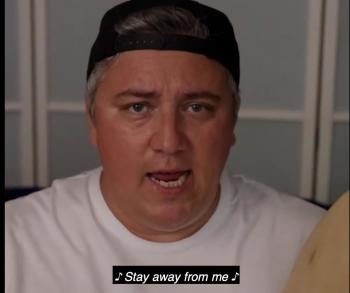Image Caption
Local Journalism Initiative Reporter
Windspeaker.com
The National Association of Friendship Centres (NAFC) is hosting a nationwide campaign to dispel myths and bring forward the science around COVID-19.
“Take Care in COVID” is the name of the campaign which will continue throughout the summer.
Visit https://www.facebook.com/TheNAFC/ to see the videos.
Information in the videos are medically informed, science-driven and based on real data. In addition to these two efforts, the NAFC will also be putting out fact sheets about COVID-19 in the coming weeks.
Comedy is a key piece of the strategy, which is where McMahon comes in, bringing humour to a very serious subject.
“I am so proud to be a part of this campaign and to use my comedy to help deliver useful information about COVID-19 to help keep people safe and healthy as this pandemic continues to evolve,” McMahon said in a press statement about the work he is doing now.
“It’s unbelievable to see what’s floating around on the internet and even being shared by friends or even family members. That’s why there is such a need to get trusted information out there,” he added.
In the first video released by NAFC, McMahon appears to be rubbing his arms, slathering on sunscreen. He talks about his excitement around soon jumping into a lake and “soaking in all that luxurious vitamin D, and keeping away COVID-19.” Then a buzzer rings and the word “FALSE” presents itself across the screen. The point is to let audiences know that vitamin D protecting them from getting COVID-19 is a misconception. The video is only 30 seconds long, but long enough to make the point.
According to Formsma, as many as six videos will be released. In her experience most people are complying with the advisories as we enter new phases of COVID-19 restrictions and people begin to gather again, but there’s an undercurrent of a few people who either don’t trust the advice coming from professionals or just have more questions that need answers.
“This pandemic has hit urban Indigenous communities especially hard. Indigenous people living in urban settings have faced multiple challenges in being recognized and appropriately supported throughout the pandemic response,” said Formsma.
“As friendship centres, we were concerned that no one was really speaking to urban Indigenous populations. While the impact of COVID-19 on Indigenous people is not funny, we know how our people use humour to get through many difficult situations. We wanted to find a creative, accessible and memorable way to bring credible resources to people and help keep them and their families safe,” she said.
She’s seen some particularly serious myths circulating, like that the entire disease is a conspiracy, or that a person shouldn’t get tested because the test will give them the virus, to name a few. That kind of misinformation can be harmful because it can contribute to the spread of the disease, she said.
And the virus itself can be characterized as a trickster, like the one in many Indigenous people’s traditional stories, she added.
“We can stop the trickster by doing these things… by washing your hands, by being careful when you’re in public, by wearing masks to protect other people. These are just very simple things we can do to prevent potential outbreak in our communities, whether that’s on reserve, in the north, or in the cities or towns where people are living,” she said.
“The virus is doing what it can to travel, to grow, and to spread, and it’s up to us by doing these things to stop it as soon as we can,” said Formsma.
Christopher Sheppard-Buote, president of NAFC confirms the importance of taking the humourous approach to the cause.
“As Indigenous people, humour is extremely important to us. It has helped with resiliency… It has helped with family bonding... But also, within friend groups. And we thought that using humour as an approach, and making sure that we have good, reliable, strong information around what individuals can do in keeping themselves safe, was probably one of the more unique takes that we could actually use,” he said.
“Nationally, we thought, ‘Well, if were going to work towards providing information, let’s take a very Indigenous approach to that,’” added Sheppard-Buote.
The federal government allocated $15 million to urban Indigenous organizations like NAFC in April as part of the Indigenous Community Support Fund for COVID-19. The funding can help with campaigns such as this one. An additional $75 million was made available to these organizations in May.

